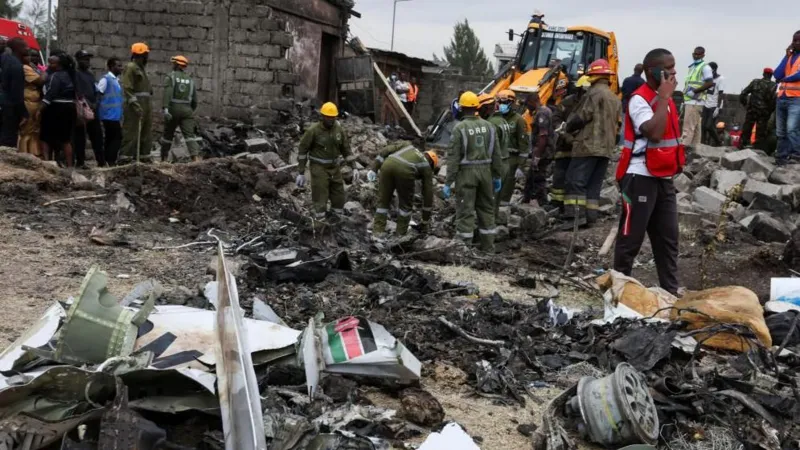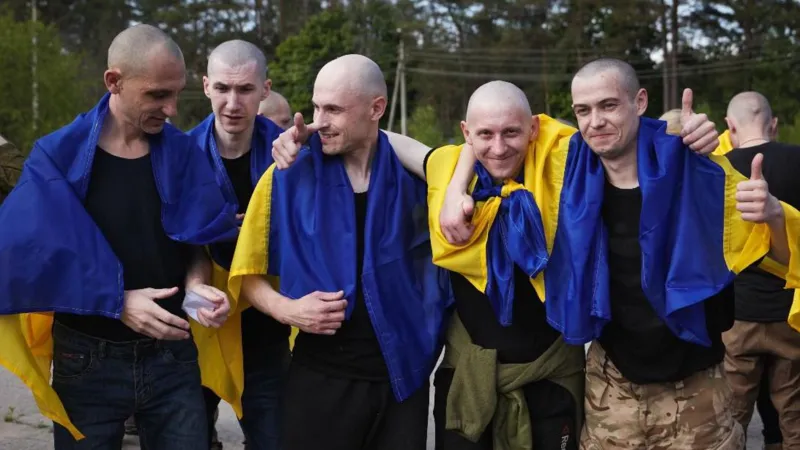Ukraine 'fires US-made long-range missiles at Russia' hours after Putin lowers nuclear weapon threshold
Ukraine has fired US-made ATACMS missiles at Russian territory, the Russian defence ministry has said.

Six long-range missiles were launched at the Bryansk region, reported Russian state media channel RIA Novosti, citing the ministry.
Five missiles were shot down by air defence systems while one was damaged, the fragments of which fell on the territory of an unspecified military facility and caused a fire, the ministry added.
The missiles caused no casualties, RIA Novosti cited the ministry as saying.
The launch comes after President Joe Biden lifted restrictions on Ukraine using US-made longer-range missiles to strike targets deep inside Russia.
The Ukrainian military did confirm it had targeted a military facility around 70 miles inside Russia, but stopped short of specifying what weapons it had used. A Ukrainian official source and a US official reportedly confirmed it had used ATACMS (Army Tactical Missile System) to the Reuters news agency.
Russian foreign minister Sergei Lavrov told reporters at the G20 Summit in Rio de Janeiro that the attack on the Bryansk region was a "signal" that the West wanted an escalation.
Military experts have said using US missiles to attack positions in Russia could help Ukraine defend Kursk - a pocket of Russian territory it captured in August - as a bargaining chip, but is not likely to have a decisive impact on the course of the war.
Earlier on Tuesday, President Vladimir Putin formally lowered the threshold for Russia's use of its nuclear weapons.
The new doctrine allows for a potential nuclear response by Moscow, even in the case of a conventional attack on Russia by any nation that is supported by a nuclear power.
Confirmation of a lowering of Russia's threshold for the use of nuclear weapons emerging on the same day Moscow says Ukraine has fired US ballistic missiles against Russian territory for the first time is surely no coincidence.
Instead, it appears that Vladimir Putin's nuclear sabre-rattling has reached a new and even more dangerous level.
The Russian president has repeatedly used implicit and direct threats of deploying nuclear weapons against Ukraine and its allies since he launched his full-scale invasion of his neighbour 1,000 days ago.
British and American officials say they believe this to be a ploy to scare the West into not giving Kyiv the increasingly lethal weapons it needs to fight – and have urged their respective capitals not to heed the Russian scare tactics.
But Mr Putin's nuclear brinksmanship has at the very least slowed key decisions by western capitals - such as the gifting of tanks, jets and missiles to the Ukrainian military – for fear of triggering a new escalation in the violence from Russia.
Each time, though, the West has provided a new level of military aide, the nuclear threat never materialised.
Washington will be hoping the same is true this time, after Joe Biden finally agreed to allow Ukraine to fire US-supplied ballistic missiles against targets inside Russia.
Mr Putin has warned that such a move could trigger a global conflict.
Whether he really plans to escalate the war in Ukraine to a direct confrontation with NATO, though, or whether the threats were once again just bluster, will now be tested following claims by his own defence ministry that Ukraine has fired six Army Tactical Missile System (ATACMS) missiles into Russia on Tuesday.
Kyiv has yet to comment.
When asked if a Ukrainian attack using ATACMS missiles could potentially trigger a nuclear response, Kremlin spokesman Dmitry Peskov said the doctrine deems the Russian Federation "reserves the right to use nuclear weapons in the event of aggression with the use of conventional weapons against it" where that is deemed to have created "a critical threat to sovereignty or territorial integrity".
Moscow has often made a series of threats to the West over its support for Ukraine throughout the war, often invoking the spectre of a nuclear response.
However, most analysts have suggested the warnings will not actually be acted on and are simply designed to deter Western nations from providing Kyiv with military backing.
Prime Minister Sir Keir Starmer denounced the revised nuclear doctrine as the "latest example of irresponsibility" from "the depraved Russian government", according to spokeswoman Camilla Marshall.
"Russia's the one that continues to escalate this war, and the use of North Korean troops is just one example of that," Ms Marshall said.
The developments came on the same day the conflict in Ukraine entered its 1,000th day.
Speaking in Ukraine's parliament, Volodymyr Zelenskyy said the war had reached a decisive moment and revealed Kyiv had plans for a huge ramp-up in the production of strike weapons.
He said the country would produce at least 30,000 long-range drones next year and aims to make at least 3,000 cruise missile and missile-drones.
The Ukrainian president said he was working with all partners to win their support for longer-range strikes.
Britain also sanctioned 10 Russian officials and state-linked youth organisations, who they said were involved in a systematic attempt to indoctrinate Ukraine's children.
Ukrainian forces remain under severe Russian pressure on the battlefield at places on the estimated 620-mile front line where its army is stretched thin. Ukrainian civilians have also been repeatedly targeted by Russian drones and missiles.
-SKY NEWS






